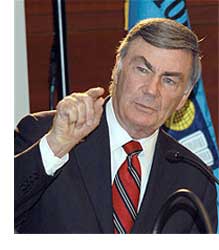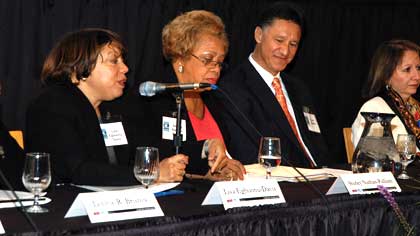The School of Nursing’s year-long Milestone Celebration closed with “Who Will Care for Us? Who Will Receive Care?”, an expert-to-expert town hall. Health care experts and legislators shared their perspectives on causes, results, and solutions regarding the pervasive health care disparities now affecting millions of people throughout the United States.

The event, held Tuesday, May 3, 2005, at the Johns Hopkins University School of Nursing, was hosted by Dean Martha Hill and moderated by ABC News correspondent Sam Donaldson. Federal, state, and local expert panelists included:
-
- Dr.Elias Zerhouni, Director, National Institutes of Health
- Dr. Peter Beilenson, Health Commissioner, Baltimore City Department of Health
- The Honorable Shirley Nathan-Pulliam, Delegate, Maryland General Assembly; Chair, Minority Health Disparities Subcommittee
- Dr. Antonia M. Villarruel, Associate Professor and Director, Center for Health Promotion, University of Michigan; Vice-President, National Coalition of Ethnic Minority Nursing Association.
- Dr. Lonnie R. Bristow, Former President, American Medical Association; Chair, Institute of Medicine Committee on Institutional and Policy Level Strategies for Increasing Diversity of the U.S. Healthcare Workforce
- Mr. Leo Nolan, III, Senior Policy Analyst – External Affairs for the Office of the Director, Indian Health Service, U.S. Department of Health and Human Services
- Dr. Lisa Egbuonu-Davis, Pfizer Scholar-in-Residence, Spelman College, Women’s Research and Resource Center
Dean Hill described the event as both “the capstone of a Milestone Celebration year during which Hopkins Nursing honored our past successes and marked our current accomplishments” and “the foundation for a future that will see the School of Nursing continue to be ranked among the top tier of schools nationwide that are known for excellence in community health nursing and outreach to populations in need.”
Moderator, Sam Donaldson:
Choose one element that you think creates these disparities.
- Beilenson: “Lack of equal access to comprehensive health coverage.”
- Bristow: “We are missing the opportunity to train people who would perfectly fit what society needs in terms of being competent and compassionate and being able to give culturally sensitive care.”
- Egbuonu-Davis: “We’re not consistently delivering the highest quality that is evidence-based.”
- Nathan-Pulliam: “Education of health professionals. We have got to make sure that we understand what cultural sensitivity is.”
- Nolan: “Socioeconomic infrastructure or lack thereof. Good education programs.”
- Villarruel: “A lack of moving beyond the health care system to really looking at some of the other infrastructure, both of public health education and also looking more at prevention.”
- Zerhouni: “Connectedness. There is a connected population, which knows about health, health literacy, knows to access it, how to access it. And then there’s a disconnected part of our population.”
| “I think we have the best medical care…but I don’t think we have the best health care.” —Dr. Elias Zerhouni “We need more nurses.” “What we have to do is tie in health disparity and the cost, the cost to society in terms of lives, the cost to business in terms of lack of productivity, the cost to the state. And if we’re able to show the costs, I think we’ll be able to turn this whole thing around.” “Stereotyping and prejudice and bias do influence how very well-meaning, very well-educated, and very altruistic people behave.” “The problem of disparity, I believe, should be divided into clearly defined issues and an effort made to generate bipartisan support.” “Today, there are 45 million uninsured and an additional 45 million who have such poor health care coverage that they can’t afford primary and preventive care.” “We need to be working with communities and each of us has a part to play.” “Minority scientists, physicians, nurses are not the only ones that have an obligation to work in those communities.” |
